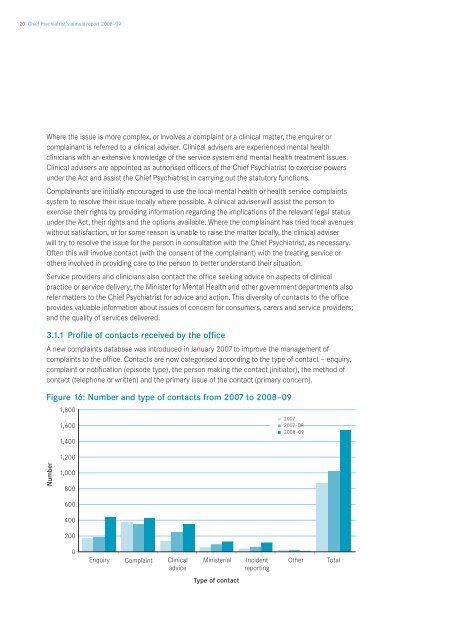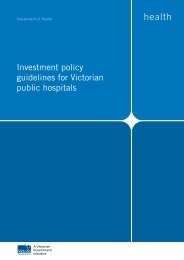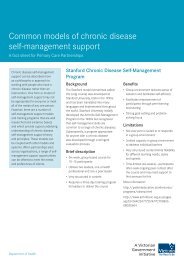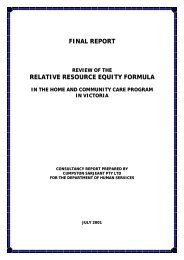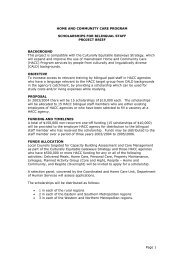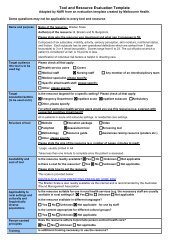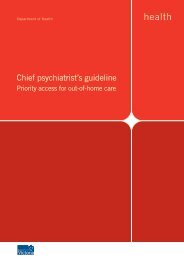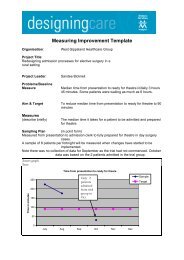Chief Psychiatrist's annual report 2008-09 - Department of Health
Chief Psychiatrist's annual report 2008-09 - Department of Health
Chief Psychiatrist's annual report 2008-09 - Department of Health
You also want an ePaper? Increase the reach of your titles
YUMPU automatically turns print PDFs into web optimized ePapers that Google loves.
20 <strong>Chief</strong> Psychiatrist’s <strong>annual</strong> <strong>report</strong> <strong>2008</strong>–<strong>09</strong><br />
Where the issue is more complex, or involves a complaint or a clinical matter, the enquirer or<br />
complainant is referred to a clinical adviser. Clinical advisers are experienced mental health<br />
clinicians with an extensive knowledge <strong>of</strong> the service system and mental health treatment issues.<br />
Clinical advisers are appointed as authorised <strong>of</strong>ficers <strong>of</strong> the <strong>Chief</strong> Psychiatrist to exercise powers<br />
under the Act and assist the <strong>Chief</strong> Psychiatrist in carrying out the statutory functions.<br />
Complainants are initially encouraged to use the local mental health or health service complaints<br />
system to resolve their issue locally where possible. A clinical adviser will assist the person to<br />
exercise their rights by providing information regarding the implications <strong>of</strong> the relevant legal status<br />
under the Act, their rights and the options available. Where the complainant has tried local avenues<br />
without satisfaction, or for some reason is unable to raise the matter locally, the clinical adviser<br />
will try to resolve the issue for the person in consultation with the <strong>Chief</strong> Psychiatrist, as necessary.<br />
Often this will involve contact (with the consent <strong>of</strong> the complainant) with the treating service or<br />
others involved in providing care to the person to better understand their situation.<br />
Service providers and clinicians also contact the <strong>of</strong>fice seeking advice on aspects <strong>of</strong> clinical<br />
practice or service delivery; the Minister for Mental <strong>Health</strong> and other government departments also<br />
refer matters to the <strong>Chief</strong> Psychiatrist for advice and action. This diversity <strong>of</strong> contacts to the <strong>of</strong>fice<br />
provides valuable information about issues <strong>of</strong> concern for consumers, carers and service providers;<br />
and the quality <strong>of</strong> services delivered.<br />
3.1.1 Pr<strong>of</strong>ile <strong>of</strong> contacts received by the <strong>of</strong>fice<br />
A new complaints database was introduced in January 2007 to improve the management <strong>of</strong><br />
complaints to the <strong>of</strong>fice. Contacts are now categorised according to the type <strong>of</strong> contact — enquiry,<br />
complaint or notification (episode type), the person making the contact (initiator), the method <strong>of</strong><br />
contact (telephone or written) and the primary issue <strong>of</strong> the contact (primary concern).<br />
Figure 16: Number and type <strong>of</strong> contacts from 2007 to <strong>2008</strong>–<strong>09</strong>


